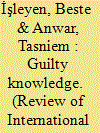| Srl | Item |
| 1 |
ID:
171819


|
|
|
|
|
| Summary/Abstract |
This paper examines the EU Police Mission in the Palestinian Territories (EUPOL COPPS) with a focus on its effects on everyday police work on the ground. The main argument is that the mission illustrates the ways in which its training and advisory activities work to foster logics and practices that feed into and reproduce the borders that have over the years been imposed, primarily through Israeli security practices. Operating under conditions of contested statehood, EUPOL COPPS promotes Palestinian policing activities based on particular spatial logics and actions as to the governance of the Palestinian population. The article presents new empirical material collected through interviews and document analysis. As such, it aims to build bridges between the literature on critical border studies, EU external relations, the EU’s role in the Israeli–Palestinian conflict as well as the literature on the EU police missions in conflict and post-conflict missions by emphasising their spatial dimension.
|
|
|
|
|
|
|
|
|
|
|
|
|
|
|
|
| 2 |
ID:
193303


|
|
|
|
|
| Summary/Abstract |
This article studies practices of knowledge production during counterterrorism financing court cases in European courts. Developments in international law have contributed to novel regulations to criminalise and prosecute the funding of terrorism in advance of terrorist violence. In this study, we study how court cases have become important spaces for contesting and evaluating multiple knowledge claims on terrorist threat and suspicion by analysing case proceedings from both the Netherlands and the United Kingdom. Building on recent debates in International Relations and postcolonial theory, we make two contributions. First, building on insights from postcolonial literature on ‘abyssal thinking’, we illustrate how legal practices differentiate between different ways of knowing by dismissing certain experiences as ‘emotional’ or ‘subjective’ in contrast to the assumed objectivity of other knowledge claims. We argue that decisions on what counts as knowledge in a court setting are situated in a specific sociopolitical setting, whereby particular knowledge and life-worlds are recognised at the expense of others. Second, we empirically show how the novel criminal laws shifts the responsibility to know terrorist threat from the state to ordinary citizens. We illustrate how the court reinforces new security logics where the state can entertain doubt, uncertainty, and trust in their practices, while the citizens cannot.
|
|
|
|
|
|
|
|
|
|
|
|
|
|
|
|